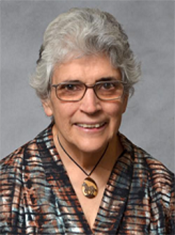Lynda Ellis
Lynda Ellis was born in Los Angeles, California. She received her BS in Chemistry from the University of Southern California in 1965 and her PhD in Biochemistry from Brandeis University in 1971. Upon receiving her PhD, Dr. Ellis moved to the University of Minnesota to complete a post-doctoral fellowship with Dr. Clare Woodward in the Department of Biochemistry and the Department of Laboratory Medicine. In 1973, Dr. Ellis was hired as an assistant professor in the Department of Laboratory Medicine and Pathology, where she joined the Division of Health Computer Sciences. The following year, she was appointed Director of Health Information Systems Instruction within the Division, a position she held until 1979. From 1975 to 1984, Dr. Ellis served as coordinator of the National Library of Medicine trainees within the Division, and beginning in the late 1970s, she was supervisor of the Health Sciences Instructional Computing Laboratory. During her tenure at the University, Dr. Ellis has taken two sabbaticals; the first was spent as an Information Systems Analyst at 3M (1985) and the second as a visiting professor in the Department of Biochemistry (1993-1994). It was during this second sabbatical, while working with biochemist Lawrence Wackett, that Ellis and Wackett developed an innovative microbial biotechnology database on the World Wide Web: the University of Minnesota Biocatalysis/Biodegradation Database. Dr. Ellis’s other research has focused on computer-based patient education and computational biology.
Interview Abstract
Lynda Ellis begins by discussing her educational background and her arrival at the University of Minnesota. She describes her first years in the Division of Health Computer Sciences, the atmosphere of the Department of Laboratory Medicine and Pathology, and her colleagues in the Department. She then discusses her initial research in computer-based patient education; the graduate program in Biometry and Health Information Systems; and her year of leave at 3M. Dr. Ellis next describes her collaborative work with Larry Wackett and the development of the University of Minnesota Biocatalysis/Biodegradation Database, and then returns to the subject of her work on computer-based patient education. She discusses the National Library of Medicine Training Grant program; the development of the Health Sciences Instructional Computing Laboratory; the important role of the Biomedical Library in the history of health informatics at the University; the leadership styles of Eugene Ackerman and Laël Gatewood; and the number of women in health informatics.
